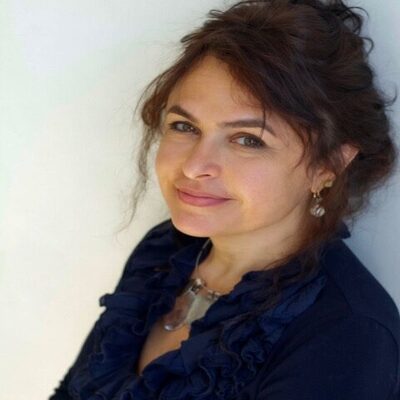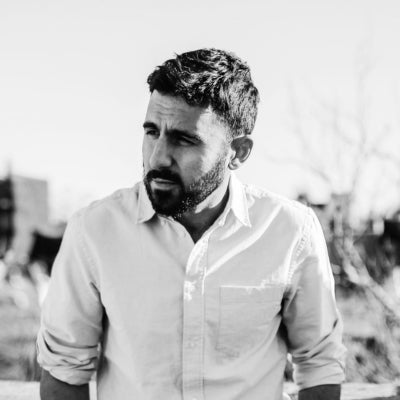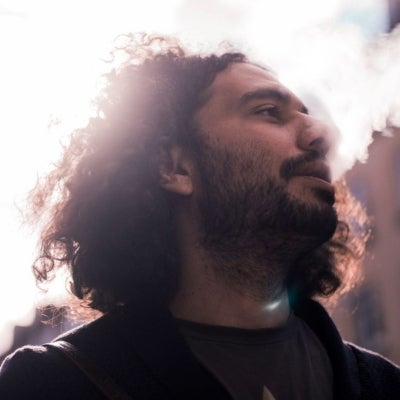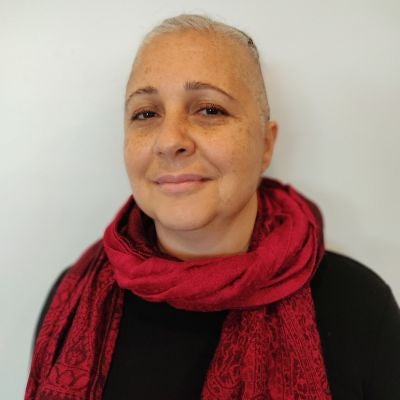Art as Resistance
This panel will portray the vital role of civil society and non-political actors in supporting Palestinian rights through visual arts, literature, film, and other forms of cultural expression. Panelists will highlight successful examples of creative resistance, including non-political artistic endeavors, and discuss how these cultural strategies can be expanded or adapted to address new challenges.

Sami Hermez (Moderator)
Sami Hermez, is Director of the Liberal Arts Program and Associate Professor in Residence of anthropology at Northwestern University in Qatar. He is the author of War is Coming: Between Past and Future Violence in Lebanon (UPenn 2017), and My Brother, My Land: A Story from Palestine (Stanford 2024), that tells the story of a Palestinian family resisting ongoing Israeli settler colonialism. His broader research concerns include the study of social movements, the state, the future, memory, violence, and critical security in the Arab World. He has held posts as a visiting scholar in the Department of Anthropology at Harvard University, University of Pittsburgh’s Visiting Professor of Contemporary International Issues, a visiting professor of anthropology at Mt. Holyoke College, and a postdoctoral fellow at the Centre for Lebanese Studies, St. Antony’s College, Oxford University.

Selma Dabbagh
Selma Dabbagh is a writer and a lawyer. She has worked for human rights organizations and law firms in Jerusalem, Cairo, and London. In recent years she worked to establish the International Centre of Justice for Palestinians (ICJP) as its COO and is currently establishing the Palestine Justice Fund (PJF) a British strategic re-granter (foundation) with political change for Palestinians as its focus. She writes both fiction and non-fiction. Her debut novel Out of It (Bloomsbury, BQFP, 2011) set between Gaza, London, and the Gulf was listed as a best book on Israel/Palestine by The Guardian in 2024. Her fiction includes short stories, radio plays for the BBC and WDR (Germany) as well as productions for stage and screen. She is the editor of We Wrote In Symbols; Love and Lust by Arab Women Writers (Saqi, 2021). Since October 2023 she has been writing a series of blogs for the London Review of Books on Gaza.

Omar Robert Hamilton
Omar Robert Hamilton is an author, editor, and co-founder of the Palestine Festival of Literature. Established in 2008, PalFest – as it is known – takes international authors to Palestine where they stage free, public events with their Palestinian counterparts in cities across the West Bank and ’48. Each day the guests travel to a different city where they meet activists, artists and scholars by day, and stage their events at night. International guests will typically visit Hebron, Jerusalem, Nablus, Lydd, Bethlehem and Haifa. In 2012 the festival took place exclusively in Gaza, entering through Egypt in the one year the Muslim Brotherhood were in power. PalFest has taken over 100 international authors, editors, publishers and agents over twelve editions of the festival and published two major anthologies of the work produced as a result. Since October 7th PalFest has been producing major events internationally to raise cultural pressure against the genocide, assisting writers and publishers with ongoing engagements on Palestine, and helping Gazan writers reach new audiences however possible. going engagements on Palestine, and helping Gazan writers reach new audiences however possible.

Amer Shomali
Amer Shomali is the director of the Palestinian Museum and a multidisciplinary artist who uses painting, films, digital media, installations, and comics as tools to explore and interact with the sociopolitical scene in Palestine. Much of his work examines the creation and the use of the Palestinian revolution’s iconography. His art works are part of several collections: The British Museum, The Arab World Institute, Barjeel Art Foundation, The Samawi collection, The Museum of Manufactured Response to Absence (MoMRtA), Birzeit University Museum, Al-Qattan Foundation; as well as the private collections of Dr. Ramzi Dalloul, Ms. Rana Sadik, Mr. Hashim Shawa, Mr. Rami Nimer, and Mr. George Al Ama. he co-directed an award winning animated documentary, The Wanted 18, which premiered at the Toronto International Film Festival in 2014. The film was awarded the best documentary award in Abu Dhabi, Carthage, Traverse City, and Al-Jazeera Film Festivals. The Wanted 18 was in the official submission lists for the foreign language and documentary categories of the Oscars 88th.

Zeina Zaatari
Zeina Zaatari, is the Director of the Arab American Cultural Center at the University of Illinois, Chicago. She has worked on gender and racial justice in Arab and Arab American communities both within academic and non-profit spaces in programming and producing knowledge. Before joining UIC in January 2019, she worked as Research Director at Political Research Associates, an organization that studies movements on the Right. She serves as the Associate Editor for the Middle East and Africa (northern and sub-Saharan) for the Encyclopedia of Women and Islamic Cultures. She is a trainer and mentor for The Muslim Women in the Media Training Institute supporting journalism graduate students and junior journalists in better coverage and representation of Muslim women and their issues. She is a co-founder and elected board member to the Women Human Rights Defenders-MENA Coalition. Her recent publications include two co-edited books: Routledge Handbook on Women of the Middle East co-edited with Suad Joseph (2023) and The Politics of Engaged Gender Research in the Arab Region: Feminist Fieldwork and Knowledge Production co-edited with Suad Joseph and Lena Meari (I.B.Tauris 2022). Among her other publications include: Sarah Hegazy and the Struggle for Freedom, Middle East Report Online (2020), Social Movements and Revolution in A Companion to the Anthropology of the Middle East (2015, Wiley-Blackwell), and Desirable Masculinity/Femininity and Nostalgia of the “Anti-Modernity”: Bab el-Hara Television Series as a Site of Production in Sexuality and Culture (2014). Zeina is president-elect of the Association for Middle East Women’s Studies for 2024-2026.